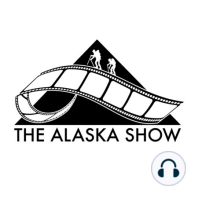47 min listen
Seaweed, The Next Deadliest Catch with Jared Fuller - TAS #3
FromThe Alaska Show
ratings:
Length:
64 minutes
Released:
Feb 26, 2020
Format:
Podcast episode
Description
This week on The Alaska Show Podcast we sit down with Jared Fuller, CTO at Saltwater Inc in Anchorage, to discuss fisheries observers, why Alaska's seafood resources are so well-managed, opportunities and risks in aquaculture and commercial fishing in Alaska, and working with other countries in management and innovation. Alex and JJ discuss Fairbanks Comic-Con with a special insider report, changes in Alaskan liquor laws, and Fur Rendezvous in Alaska News and Events. Intro, News and Events (1:20) Interview with Jared Fuller (10:55) More blogs, vids, and pods by us www.TheAKShow.com IG @alaskashow @alexandertrokey @jcoe_photographer Facebook.com/TheAlaskaShow https://www.youtube.com/channel/UCkp_iaWCQaqpzUZD_f4uHrQ/videos?view_as=subscriber Show Notes News: - Inside scoop on Comic Con in Fairbanks by special on-scene reporter Rita - New bill in Senate Finance Committee could change the way Alaskans drink about breweries, wineries, and distilleries Events: - Fur Rondy Carnival and Sled Dog Races this weekend Interview Fisheries observation is about gathering data about the fishing stock and understanding the heath of the resource. Observers are in cod and pollock mostly in Alaska. Also in the Rockfish fishery. They’re on small to large vessels. Observers are not in Salmon or Crab, which are done through the state. State and federal agencies actually hire the fisheries observers. When observers are on the boat the relationship between the observer and fishermen runs the gamut from fun and friendly to confrontational. Jared is from Texas originally and his degree was in biology. He never grew up around the ocean or salt water. He got to experience, first hand, the difficulties of boat life as an observer. Observer recruitment tends to happen at colleges that have big marine biology programs. His first boat was a pollock boat out of Akutan. Pollock is a big trawl fishery – he went out in B season that starts in May. It was tough fishing – they were scratching and trying to find the fish. He had to get used to boat life. He’s always recording information and doing paperwork – documenting when fishing starts and when the bags go in and when they haul. They collect samples as they dump fish. They collect scientific specimens like fish ear bones for age data and checking roe to see the fertility of the fish. Alaska's fisheries are known as being well-managed for a few reasons. One, the resource is so vast and productive. Two, management focuses on sustainability and took all the best lessons and from US history and applied it to Alaska. Fisheries observers tend to be college students – they turn and burn. Jared stuck on with Saltwater Inc serendipitously. He injured his knee to the point of having to have surgery. At that point Saltwater was also playing around with electronic monitoring. They were looking for someone with computer skills, which Jared had, and someone who knew boats and biology as well. Saltwater was awarded a 120-vessel contract for swordfish and tuna on the east coast. The term “electronic monitoring” is a catch-all for a lot of technology – sensors, video, etc. – that helps companies gather data without an on-scene observer. It took off for Saltwater in 2014 with this contract in the Atlantic after 2-4 years of research with pot cod fishermen in Alaska. Alaska requires a lot of innovation and it creates a tenacious attitude among the fishermen and people. Saltwater Inc is one of the few companies that exports expertise and services from Alaska to the rest of the US. Jared believes in recent years people are concerned about where their seafood comes from. Fish don’t respect political borders - we all share the same ocean. It’s important that several countries are willing to come together and discuss sustainable management practices. There are treaties and regional management groups that do that. Alaska’s economy is truly international. The fishing market is very connected to Asi
Released:
Feb 26, 2020
Format:
Podcast episode
Titles in the series (62)
Ep. 2 - Doug Waclawski - Principal of Homer High School: From Kalkaska to Alaska, Homer High's Principal Doug Waclawski by The Alaska Show
